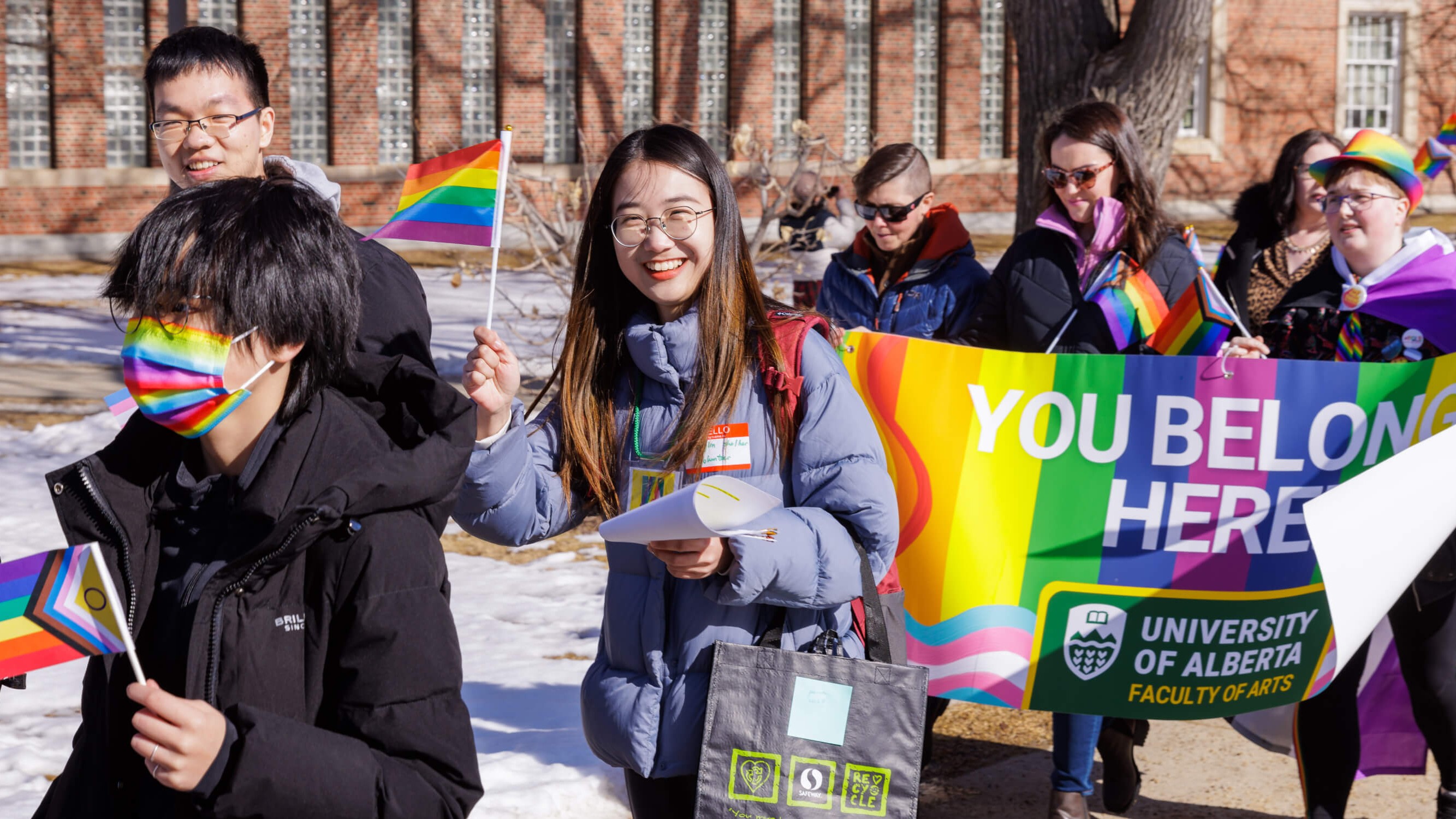While reviewing research on marginalized populations as a student, Evan Westfal was often struck by the same dilemma.
“I felt like people were making a spectacle of a given social problem and not working towards active solutions,” says the programs manager for the Fyrefly Institute for Gender and Sexual Diversity.
“That’s why I love the Fyrefly Institute— we run actionable strategies to push human rights to the forefront.”
The Fyrefly Institute has had a number of names since it was founded in the Faculty of Education in 2004 as the only institute of its kind in Canada. But over its 20-year history, community service has always been at the centre of its research agenda.
The institute takes its name from Camp fYrefly, also founded in 2004 by former Faculty of Education researchers and educators André Grace and Kristopher Wells, to meet the needs of sexual and gender diverse youth.
From the beginning, it has made an immeasurable difference in their lives. It is now Canada’s only national sexual and gender diversity youth leadership camp affiliated with a major research university.
“I grew up in group homes and didn’t have a family from age 11,” says Aaron Janzen, a former camp participant. “I was the only one in school getting teased and bullied, and I felt like the only gay kid.
“I went to fYrefly at the age of 13 and didn’t know there were that many queer youth. I felt I didn’t have to be afraid and could be comfortable with who I was.”
Some Camp fYrefly alumni from the past two decades are now working as organizers for Camp Dragonfly, a camp for queer and trans children under 13, or for the Edmonton Lesbian Event Network, says Westfal. Others have become journalists, fashion designers, researchers, grassroots activists and award-winning drag artists.
But the Fyrefly Institute’s outreach doesn’t stop there. The non-profit organization serves more than 10,000 people in communities throughout Alberta — all participating in robust programming to help 2SLGBTQ+ youth grow into healthy, happy and resilient adults.
Just one of Fyrefly’s programs — supporting unhoused gender and sexually diverse youth — is the Community Health Empowerment & Wellness Project (C.H.E.W).
The drop-in centre in downtown Edmonton serves a population that feels unsafe in city shelters, where youth are often bullied or beaten up. So they just “float” outside, sleeping wherever and whenever they can, says former project co-ordinator Corey Wyness, known on the street as “the gay Yoda” for his role as the wise mentor who fixes everything.
“Last year C.H.E.W. had almost 6,000 touch points, where we met or welcomed somebody and did something for them,” says Fyrefly’s executive director, Glynnis Lieb.
Since 2014, the drop-in centre, or “outpost,” has been offering no-cost counselling, crisis intervention, Indigenous peer support, and community outreach for sexually transmitted infection testing, as well as clothing, food and help navigating the justice system.
For more than a decade, the institute has also held the Alberta GSA Conference, which supports students and teachers in starting, strengthening and sustaining GSA clubs (also known as gay-straight alliances, gender and sexual orientation alliances, queer-straight alliances, pride clubs, rainbow alliances and many other names) in Alberta’s K-12 schools.
Teacher Janakee Randhawa got involved with the conference as a volunteer co-ordinator while running the GSA club at Nelson Mandela High School in Calgary.
In addition to helping youth explore their own questions of gender, she says the club “really helped me come to terms with my own experiences as a closeted Punjabi queer youth,” Randhawa says. “It isn’t something I saw a lot of when I was in high school.”
The conference helps students see and hear how other GSAs are run elsewhere in the province, she adds, and the number of GSAs tends to increase after teachers attend the conference.
“We’re also seeing a lot of GSAs engaging with advocacy work, whether actual social activism or campaigning for different social and human rights issues.”
Other broad and far-reaching Fyrefly programs include personal leadership retreats for queer and trans youth, an educational initiative called Fyrefly in Schools, aimed at reducing discrimination against gender and sexually diverse youth in Alberta schools, professional development programming for teachers and free counselling for 2SLGBTQ+ youth, their families and caregivers.
A program called Where the Rivers Meet introduces students to culturally relevant teachings based on Indigenous knowledge, including traditional and contemporary perspectives on Indigenous gender and sexual diversity.
Despite those numerous and vital links to communities across the province, Fyrefly has still sometimes been mistakenly seen as exclusively devoted to research, out of touch with life on the street, says Lieb.
“We were seen as very academic and academic only, and that isn’t who we are.”
It’s one reason the institute decided to rebrand two years ago under its current name, one that updates the language of sexual and gender identity — emphasizing diverse sexualities and genders rather than minorities — but also corrects the ivory-tower misconception.
Even Fyrefly’s research has always directly benefited its community partners. Lieb points to a project in partnership with the School of Public Health examining discrimination against trans women looking for basic health services.
“It’s trying to get a dentist who will treat you with respect, or just getting medication for an ear infection. Those things are often insurmountable for trans folk — they fear how they’ll be treated.”
That research played a part in creating the LGBTQ+ Wellness Centre, says Lieb, to provide a “one-stop shop” for health services, including psychiatry, family medicine, endocrinology, urogynecology, gynecology, psychology nursing, social work and peer support.
The ace up Fyrefly’s sleeve is ensuring that all of their community service is evidence-based and informed by research, says Lieb.
“In everything we do, we make sure we’re partnering with somebody in the community and sharing our resources with them.”
